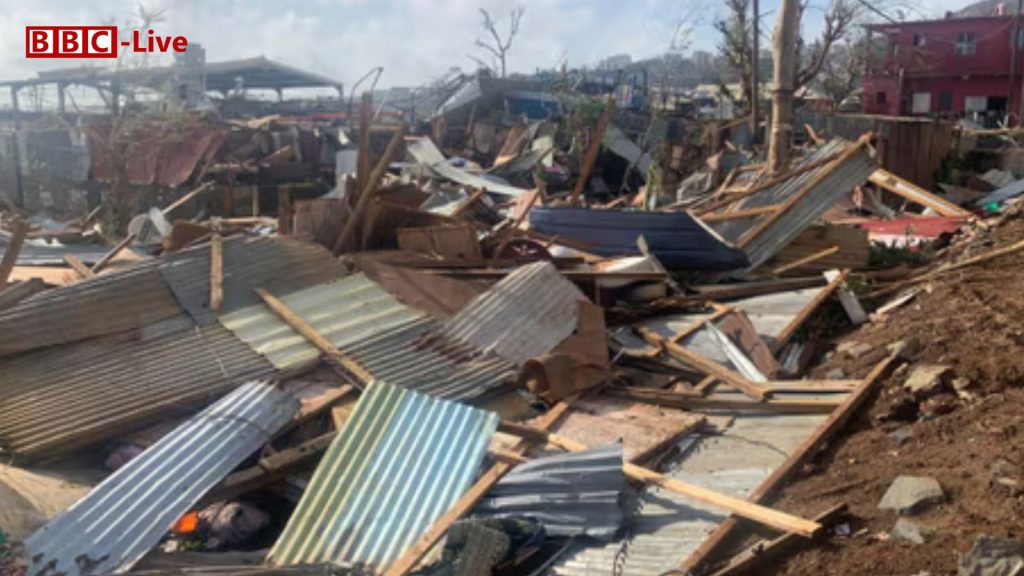
Cyclone Chido Devastates Mayotte
Cyclone Chido has struck Mayotte, a French overseas territory in the Indian Ocean. The storm is the most powerful to hit the region in 90 years. It made landfall with winds reaching at least 140 mph. The cyclone caused catastrophic damage across the island, notably in the capital, Mamoudzou, and nearby areas.
Destruction of Health Infrastructure
One of the most pressing consequences of the storm is the destruction of health services. The main hospital in Mamoudzou experienced severe damage. Key areas, including the surgical, intensive care, maternity, and emergency units, were flooded or destroyed. Medical centers throughout the island are now non-operational. This leaves the population in urgent need of assistance. Basic healthcare is currently unavailable.
French Health Minister Geneviève Darrieussecq confirmed the extensive damage, stating that the situation is dire for both residents and rescuers.
Death Toll and Destruction
Reports indicate that the death toll could be in the hundreds or even thousands. The full scale of the disaster is still unfolding. According to François-Xavier Bieuville, the prefect of Mayotte, final death toll estimates could rise to several thousand, but official numbers are still being verified.
The cyclone caused havoc to Mayotte’s poor infrastructure. Many homes and buildings, particularly in shantytowns, were completely destroyed. These informal settlements house mainly undocumented migrants from neighboring Comoros. They are particularly vulnerable and many families found themselves caught in the storm without adequate shelter.
Rescue and Relief Efforts
In response to the disaster, rescue operations are intensifying. Authorities are working quickly to reach survivors. French Interior Minister Bruno Retailleau arrived in Mayotte with military support. This includes 160 soldiers and firefighters to reinforce local rescue teams. Emergency airlifts have been initiated. This includes a first aid plane carrying medical supplies and a team of doctors. More flights and ships are expected to follow. Additional help is coming from nearby French territories like La Réunion, which is serving as a logistical base for relief efforts.
Local officials, including Ambdilwahedou Soumaila, the mayor of Mamoudzou, have emphasized the near-total destruction of the island’s infrastructure. The situation remains chaotic, with many individuals still stranded, desperately needing emergency medical care, food, and clean water.
A Challenging Situation for Migrants
A complex aspect of the disaster is the large population of undocumented migrants in Mayotte, many of whom come from Comoros. These migrants make up roughly a third of the island’s population. They face difficulties in accessing aid. Many fear that seeking help might lead to detention or deportation. This creates significant barriers to receiving the assistance they need. The issue of undocumented migration has been contentious in Mayotte for many years. The cyclone has further complicated efforts to determine how many people are in immediate need of help.
International Response
The French government has pledged significant support amidst this crisis. The European Union and international organizations are also mobilizing to assist. Ursula von der Leyen, President of the European Commission, stated that the EU is ready to provide additional humanitarian aid. The World Health Organization (WHO) confirmed its readiness to help with essential healthcare services for survivors in dire need.
The Wider Impact in the Region
While the destruction in Mayotte is severe, Cyclone Chido has also impacted neighboring countries. It initially hit Mozambique and Madagascar before reaching Mayotte. At least three deaths have been reported in Mozambique. As the storm continues across the Indian Ocean, additional regions remain at risk. The United Nations warns that approximately 1.7 million people are at risk from the cyclone’s aftermath. Countries such as Malawi, Zimbabwe, and Zambia are likely to experience severe rainfall and flooding due to the storm’s remnants.
In addition to the cyclone’s destruction, the region was already grappling with a historic drought earlier in the year. This affected millions of people in southern Africa. The current climate crisis is believed to have intensified the nature of storms like Chido, making such disasters both more frequent and severe. Meteorologists have noted that the storm’s intensity was likely fueled by exceptionally warm Indian Ocean waters.
The Road Ahead
As Mayotte embarks on the lengthy recovery process, the challenges ahead are immense. The loss of critical health infrastructure, coupled with widespread devastation, will complicate rebuilding efforts. The French government, along with international partners, must act swiftly to ensure that basic needs are met. This includes food, water, medical care, and shelter for those affected.
The resilience of the people of Mayotte will be put to the test. They must navigate the monumental task of rebuilding their lives and communities. The storm has brought to light the vulnerability of Mayotte to natural disasters. It has also underscored political and social issues related to undocumented migrants, many of whom now find themselves in even more precarious positions




